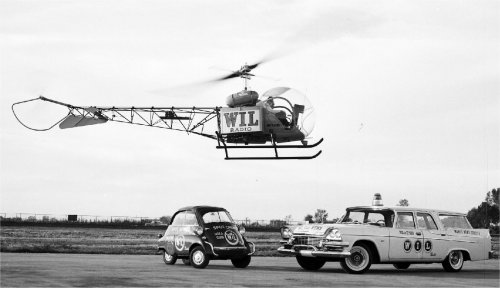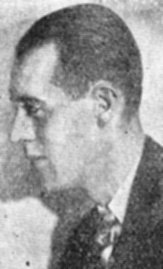Radio Articles
Uncle Billy Of KMOX Gets 2,000 Letters A Week From Fans
Uncle Billy isn’t a venerable old man with whiskers and spectacles; in fact, he isn’t old at all!
Really, he is Don Hunt, an artist of long standing at KMOX and far too young to have some 5,000 nephews and nieces. He is the sort that all little boys would want to be like and the type that little girls would like to have for their Prince Charming when they grow up. He is blonde and tall and amusing, this Uncle Bill who appears each afternoon at five o’clock to sing to little girls and boys and tell them fairy tales.
Some 2,000 of them write in to him each week seeking membership in his Peter Pan club and telling him when their birthdays are so he can keep them in his Lucky Book and have the Cuckoo bird wish them happy birthdays. He keeps close tab of all and has them recorded in case he should forget one of so many relations. No danger of his forgetting, though, for he has the Lucky Book full of them, up to little Benjamin Ballow of East St. Louis whose birthday is December 27.
And does he like those letters he receives! We found him poring over a huge stack of them which he reads and answers every day. He showed proudly the Cuckoo bird which is his sole assistant in these afternoon broadcasts. He fingered excitedly through them to show what the different authors said to him in these letters, which he described as the very “breath of radio.”
Being virtually hurled through the air one night some seven years ago quite by chance at KMOX, he became an announcer there. Since that time, he has sung and played and done dramatic sketches in stations from one end of the country to the other. He even wrote the music for and produced a play on Broadway.
One of his most successful skits was with Gwen of “Myrt and Marge” when he played in a travelogue called “Cinderella and the Cross-Eyed Bear” over KFI in Los Angeles.
Uncle Billy went to school here and has the delightful knack of remembering when he was small and the things that appealed to his very fanciful imagination. Some of the stories he tells his young followers are from a book his mother bought him when he was five years old. He learned to recite them in a high piping voice long before he could read.
Colorful figures from fairyland appeal to him and he likes to think that he is making five o’clock a happy time for little boys and girls throughout the 49th State and in far away places. In his pocket he has a snapshot of a chubby little boy who truly is his nephew.
Each youngster who becomes a member of his club receives a button, a long letter cautioning them to eat spinach and be generally model children, as well as an elaborate certificate of membership. He records their names and then they are full-fledged members of the eternally young club of which he is such an admirable exponent.
He plays and sings and likes most to do dramatic sketches which show how nicely (sic) romantic life can be. He has lived in the West and ridden cowboy ponies and listened to the howl of coyotes. Most of all he likes to drive open Fords across the Western plains which he has done several times.
A gay and charming fanciful person is he – “Bill – your Uncle Bill.”
(Originally published in Radio and Entertainment 3/26/32).


